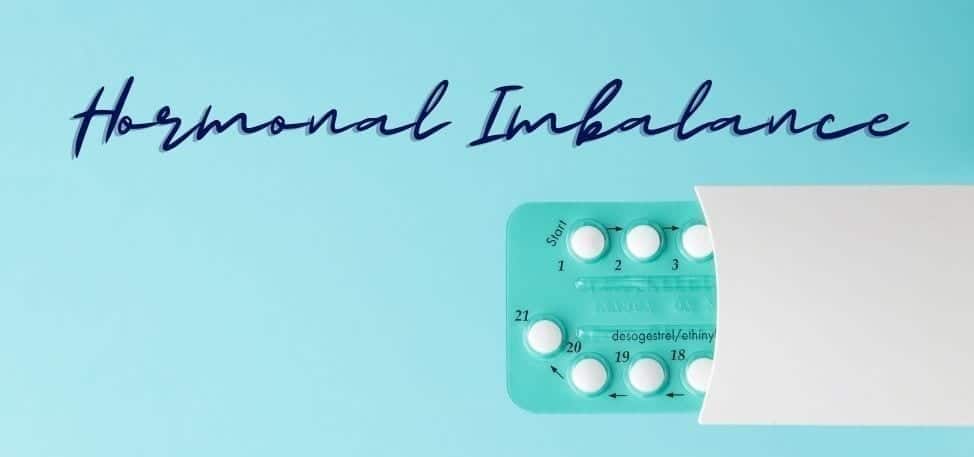Home > Hormones > Hormone issues & symptoms > Most common hormonal imbalance symptoms in females


As a woman, hormone fluctuations are a natural part of life. From dips and rises throughout your menstrual cycle to changes during menopause, each of us will experience hormone shifts at one time or another. While fluctuating hormones are normal, a hormonal imbalance can lead to numerous symptoms that can impact your daily life. From mild to more severe, there are numerous physical and emotional signs your hormones are off. Let’s explore some of the most common ones so you can decide if and when to speak to your doctor.
It is a simple way to say that your hormone levels are significantly higher or lower than what is expected for your age and the time of testing. Keep in mind that it is not a medical term or a health condition, it may simply mean your body’s reaction to a certain event in your life, such as stress or illness or a natural process, like early pregnancy—of which you may not yet be aware—or perimenopause. However, certain health conditions affect your hormone production and have specific hormone profiles.
Every woman has numerous hormones in their body that help regulate their internal systems. Reproductive female hormones like estrogen, progesterone, and even testosterone play key roles in regulating your menstrual cycle and fertility. While hormonal changes throughout the month are normal, if they fail to regulate themselves, you may experience symptoms of a hormone imbalance. But how do you know if you have symptoms of hormonal imbalance and aren’t just experiencing normal fluctuations?
You may feel that something is off without realizing exactly what it is until you write it down or log it in the app as a symptom or a specific mood. If you can manage your normal routine and what you experience is a minor disturbance, everything is likely alright, and what you feel is a result of an expected hormone fluctuation. However, if this feeling or symptom is entirely new to you, it might indicate that your hormones are affected. For example, if your skin is usually clean and soft, but all of a sudden you notice acne on your face, it may signal that oil production has increased and high levels of androgens are possible. This is a common experience for many teens entering puberty.
Additionally, if your menstrual cycle was regular but you’ve decided to follow a restrictive diet to get into shape, and this is now the second month with delayed periods, or even with one skipped period, it means your brain is putting reproduction on hold until there is enough nutrition for you and a potential embryo. As a result, your ovaries produce low levels of estrogens and progesterone.
When your hormones are out of whack, you can experience multiple signs of a hormonal imbalance that can impact your overall health. You may be surprised to learn how much hormones affect almost every part of your body. Mentally, mood swings, irritability, depression, and anxiety can all be signs and symptoms of hormone imbalance in women.
If your thyroid hormones are affected, it can also impact your metabolism, leading to weight loss or gain, tiredness, constipation, increased cholesterol, and slow or rapid heart rate. For example, if you haven’t made any changes to lose weight but suddenly notice it’s gone, and you feel more irritable than usual while preferring to wear lighter clothes because you feel too warm, it might indicate that your thyroid needs attention.
Additional signs of a hormone imbalance include heavy menstruation, irregular periods, and fertility problems, as it can affect ovulation regularity. Some women with hormone imbalances have conditions like polycystic ovary syndrome or PCOS, which can cause hair thinning, weight gain, acne, menstrual irregularities, and infertility, but that’s not always the case.
Just like there are many signs of hormonal imbalance in women, there are numerous possible causes. These can include the following:
Your lifestyle has a direct connection to how your body functions, which is why if you’re not getting enough sleep, eating poorly, consuming too much alcohol or caffeine, or experiencing high stress and anxiety, it can affect your hormone levels.
Hormonal medications like birth control or those designed to help with pregnancy, menopause, or cancer treatment impact your hormone levels; however, please note that this is the expected result.
Certain health conditions, like congenital adrenal hyperplasia, anorexia, and thyroid disorders, can disturb ovarian hormone production.
If you’re experiencing signs of hormonal imbalance, certain environmental factors could make them worse. When it comes to our hormones, chemicals can negatively impact how our bodies function. For example, pesticides and herbicides, which are present in many of the foods we eat, are endocrine disruptors, which means they interfere with your body’s natural hormone production capabilities.
Your hormonal imbalance symptoms depend on the affected organ. For example, the pituitary gland releases many hormones like the follicle-stimulating hormone (FSH,) luteinizing hormone (LH,) growth hormone, prolactin, and oxytocin. If it isn’t functioning properly, all of the hormones it releases can be affected. As Hormonas know, we specialize in reproductive hormones here, so we’ll focus on the top three symptoms of hormonal imbalance in women within these types of categories.
When it comes to your period, there are a few common signs of hormone imbalance to look out for, but how to know if you have a hormonal imbalance often requires careful monitoring of symptoms. Cycle irregularity is often the first indication that something may not be right with your hormones. Your period may be heavier, lighter, longer, shorter, or you may miss it altogether. You could also experience increased pain or cramping or severe PMS symptoms.
For women who are trying to conceive, the process can often be frustrating and disheartening. If you can identify symptoms of hormonal imbalance, it’s easier to recognize possible issues and consult with your doctor sooner. Knowing how to tell if you have a hormone imbalance starts with monitoring your periods. Irregular periods could be a sign that you’re not ovulating, which means your ovaries aren’t releasing eggs. Without a mature egg, conception can’t occur, so this step is crucial for reproduction. Along with irregular cycles, symptoms like excessive hair growth, weight gain, and severe acne could signal a condition like PCOS, a condition in which ovulation is commonly absent.
As a young woman, puberty is a major right of passage. However, for some, hormonal imbalances can make the process challenging. For young girls, understanding how to tell if your hormones are off often entails monitoring symptoms that are common, like breast tenderness, mood swings, and period irregularity during the first few menstrual cycles.
Interestingly, although they occur decades apart, hormone imbalance symptoms women experience during menopause are sometimes similar to those during puberty. Many women experience a range of symptoms during menopause, including cycle irregularity, mood swings, brain fog, sleep disturbances, weight gain, vaginal dryness, headaches, night sweats, and hot flashes.
When you experience hormonal changes, symptoms can range from mild to severe. Understanding how to know if your hormones are imbalanced and the best way to treat them can help you feel better sooner.
Irregular periods often have hormonal changes and may require a doctor’s advice. They can help identify the reasons behind these irregularities, discuss necessary lifestyle and diet adjustments, and may recommend certain treatments when required.
Sleep issues are a common occurrence when your hormone levels are off and can include insomnia, trouble staying asleep, and poor sleep quality. Many women find relief by taking over-the-counter medicines like melatonin and valerian or the occasional sleep aid. Exercising during the day, turning off electronics at night, and avoiding caffeine can provide relief. You should always talk to your doctor before starting any medications, and they can also offer advice on dealing with persistent sleep problems.
Mood changes like feeling low, depressed, and irritated without an obvious reason are common, which is taking time for yourself, identifying potential triggers, spending time outside, and talking to a therapist can make a huge difference in how you feel. Because estrogens and progesterone can impact neurotransmitters in your brain, mood changes are common signs of hormonal imbalance in women.
Learning how to know if your hormones are off can be tricky, but experiencing intense fatigue is often a sign. Going to sleep earlier, eating a well-balanced diet, drinking enough water, and limiting caffeine can help you feel more energized throughout the day.
Many women experience weight loss or gain from hormonal imbalances, which can impact their daily lives. Lifestyle changes like mindful eating, exercising, avoiding processed foods, staying hydrated, and increasing your vegetable, fruit, and lean meat intake can help you manage your weight effectively.
Acne is common with hormonal imbalances, as it results from excess sebum production in the skin which can be due to elevated levels of androgens. Using a gentle cleanser on your face twice a day and maintaining adequate moisture with a mild moisturizer can help balance and clear the skin.
If you experience vaginal dryness, you’re not alone; it is a common postmenopausal symptom. Decreased estrogen levels can cause the walls of the vagina to thin, dry out, and become inflamed. Over-the-counter lubricants can provide relief, but for hormonal support, you should consult your doctor.
Migraines and hormonal imbalances can go hand in hand. If you are prone to migraines, you can track their occurrence and severity to determine if there is a link between hormone fluctuations during your menstrual cycle. Some women are sensitive to drops in estrogen, and their migraines may follow this pattern. Providing a clear picture of your symptoms to your doctor can help them prescribe more precise medication and establish an appropriate schedule.
A decreased libido can be caused by decreased estrogen levels, stress, and medications prescribed to help balance hormones. While you can talk to your doctor about ways to increase your sex drive, you should also evaluate your relationships with your partner, any recent life events that could have impacted your libido, and your workload, as constantly feeling tired does not contribute to an increased sex drive.
Hair loss can be a difficult side effect of a hormonal imbalance, as it could affect your self-esteem. While there’s no quick way to help regrow your hair, your doctor can help you create a treatment plan that includes lifestyle changes, medications, and supplements.
Knowing when to see a doctor for a possible hormonal imbalance can be confusing. Even if you’re unsure whether you’re experiencing signs of a hormonal imbalance, it’s always a good idea to talk to your doctor if you have the following:
The Hormona app is the award-winning at-home hormone tracker that provides tools and insights into your hormone health. You can track your cycles, symptoms, mood changes, and learn how to change your lifestyle to adopt healthy habits that provide opportunities to minimize the negative effects of the environment. Now, you can test your hormone levels at home with Hormona Wellness Tests, with results sent directly to your phone. Say hello to the future of women’s health with Hormona.

-


Dr Singh is the Medical Director of the Indiana Sleep Center. His research and clinical practice focuses on the myriad of sleep.

What vaginal discharge colors mean for your health Understanding vaginal discharge colors and meaning is essential for every woman at every stage of life. While some colored discharge may indicate infections, others are normal. White and clear The first discharge

Understanding perimenopause and menopause When talking about perimenopause versus menopause, it’s easy to confuse these two stages. Perimenopause is the transitional period when you move away from your peak fertility and your ovaries gradually stop releasing eggs. In turn, menstruation

Understanding perimenopause and its symptoms When it comes to aging, many women know about menopause but are surprised to learn about the transitional stage leading up to it, called perimenopause. There are three stages of perimenopause: early, late, and menopause,
| Cookie | Duration | Description |
|---|---|---|
| cookielawinfo-checkbox-analytics | 11 months | This cookie is set by GDPR Cookie Consent plugin. The cookie is used to store the user consent for the cookies in the category "Analytics". |
| cookielawinfo-checkbox-functional | 11 months | The cookie is set by GDPR cookie consent to record the user consent for the cookies in the category "Functional". |
| cookielawinfo-checkbox-necessary | 11 months | This cookie is set by GDPR Cookie Consent plugin. The cookies is used to store the user consent for the cookies in the category "Necessary". |
| cookielawinfo-checkbox-others | 11 months | This cookie is set by GDPR Cookie Consent plugin. The cookie is used to store the user consent for the cookies in the category "Other. |
| cookielawinfo-checkbox-performance | 11 months | This cookie is set by GDPR Cookie Consent plugin. The cookie is used to store the user consent for the cookies in the category "Performance". |
| viewed_cookie_policy | 11 months | The cookie is set by the GDPR Cookie Consent plugin and is used to store whether or not user has consented to the use of cookies. It does not store any personal data. |
